Content Summary
The liver is an incredible organ that plays a vital role in maintaining our overall health and well-being. Its functions are diverse and essential for our body's daily processes. In this article, we will explore the functions of the liver, understand the impact of alcohol on the liver, discuss foods that can damage or cleanse the liver, and discover herbs that promote liver health.
The Liver's Functions
The liver is the largest internal organ and is located on the right side of the abdomen. It performs a multitude of functions that are crucial for maintaining our health:
Detoxification: The liver acts as our body's primary detoxification center, breaking down toxins, drugs, and chemicals, and converting them into less harmful substances for elimination.
Metabolism: It plays a vital role in carbohydrate, protein, and fat metabolism. The liver helps regulate blood sugar levels, converts excess glucose into glycogen for storage, and produces bile for fat digestion.
Nutrient Storage: The liver stores essential nutrients such as vitamins (A, D, E, K, and B12), minerals (iron and copper), and glycogen, which are later converted into glucose for energy.
Protein Synthesis: The liver produces proteins vital for blood clotting, immune system function, and transportation of substances throughout the body.
Alcohol and the Liver
Excessive alcohol consumption can have detrimental effects on the liver. Alcohol is metabolized in the liver, and chronic alcohol abuse can lead to a range of liver diseases, including fatty liver, alcoholic hepatitis, and cirrhosis. The liver prioritizes alcohol metabolism over other important functions, accumulating fat, inflammation, and scarring. It is crucial to moderate alcohol consumption and seek professional help if struggling with alcohol-related issues.
Foods that Damage the Liver
Certain foods can put a strain on the liver and contribute to its damage if consumed excessively:
Processed and Fried Foods: These foods often contain high levels of unhealthy fats, preservatives, and additives that burden the liver and promote inflammation.
Sugary Foods and Beverages: Excessive sugar intake can contribute to non-alcoholic fatty liver disease by causing fat to accumulate in the liver.
High-Sodium Foods: Excessive sodium intake can lead to fluid retention and increase the risk of liver damage, especially in individuals with pre-existing liver conditions.
Foods that Support Liver Health
Fortunately, there are numerous foods that promote liver health and help protect against liver damage:
Leafy Green Vegetables: Spinach, kale, and other leafy greens are rich in antioxidants and chlorophyll, which aid in liver detoxification.
Cruciferous Vegetables: Broccoli, Brussels sprouts, and cauliflower contain compounds that support the liver's natural detoxification process.
Berries: Blueberries, raspberries, and cranberries are packed with antioxidants that help protect liver cells from damage.
Healthy Fats: Incorporating healthy fats from sources like avocados, nuts, and olive oil supports a healthy liver by reducing inflammation.
Herbs for Liver Health
Several herbs have long been used to support liver health:
Milk Thistle: Known for its potent antioxidant and anti-inflammatory properties, milk thistle helps protect liver cells and supports liver regeneration.
Dandelion Root: Dandelion root aids in liver detoxification, promotes bile production, and supports healthy liver function.
Turmeric: Curcumin, the active compound in turmeric, has powerful anti-inflammatory and antioxidant effects that benefit liver health.
Author's Choice of Liver Health Herbs:
1.Herbal Liver Support Supplement with Milk Thistle Dandelion Root Turmeric and Artichoke Extract
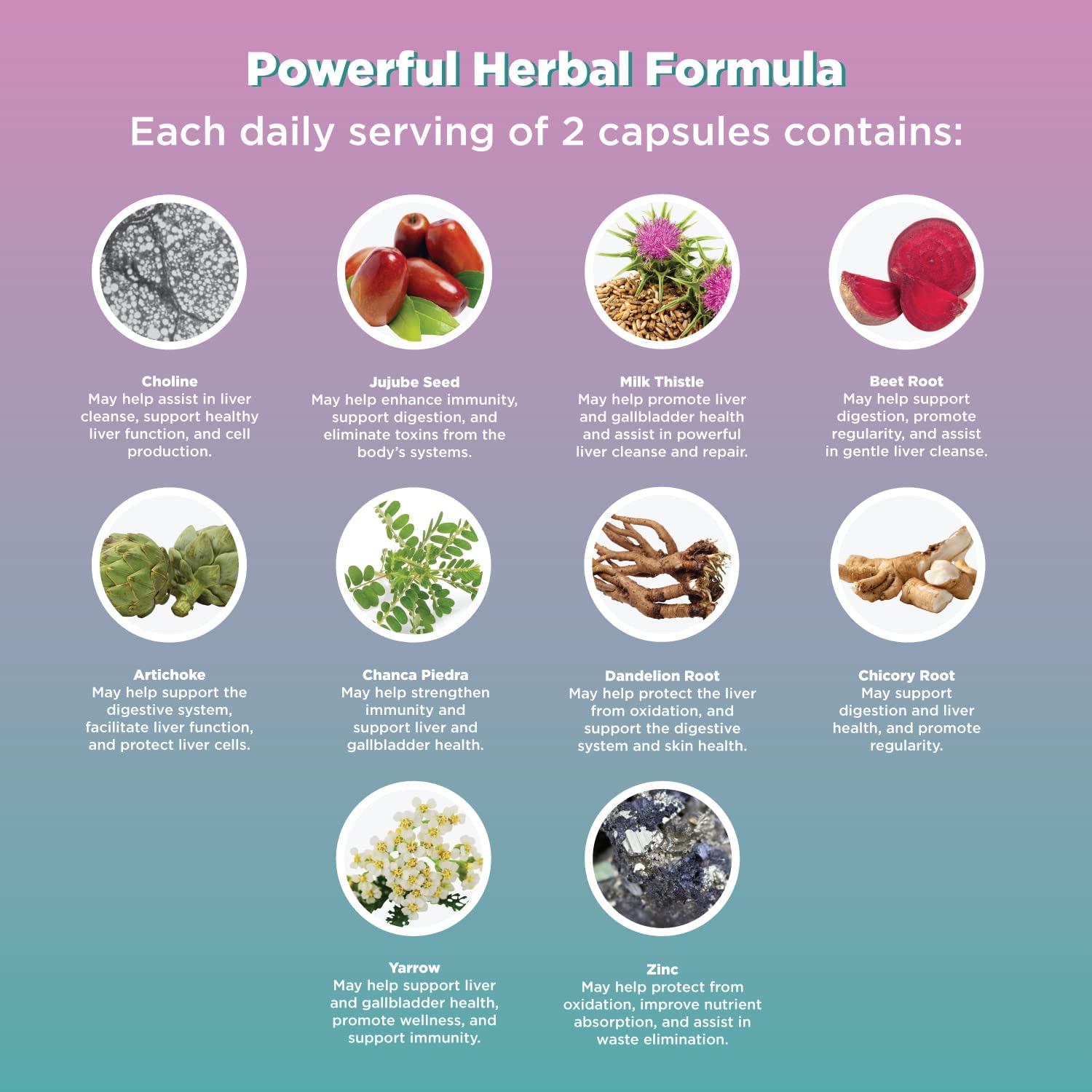
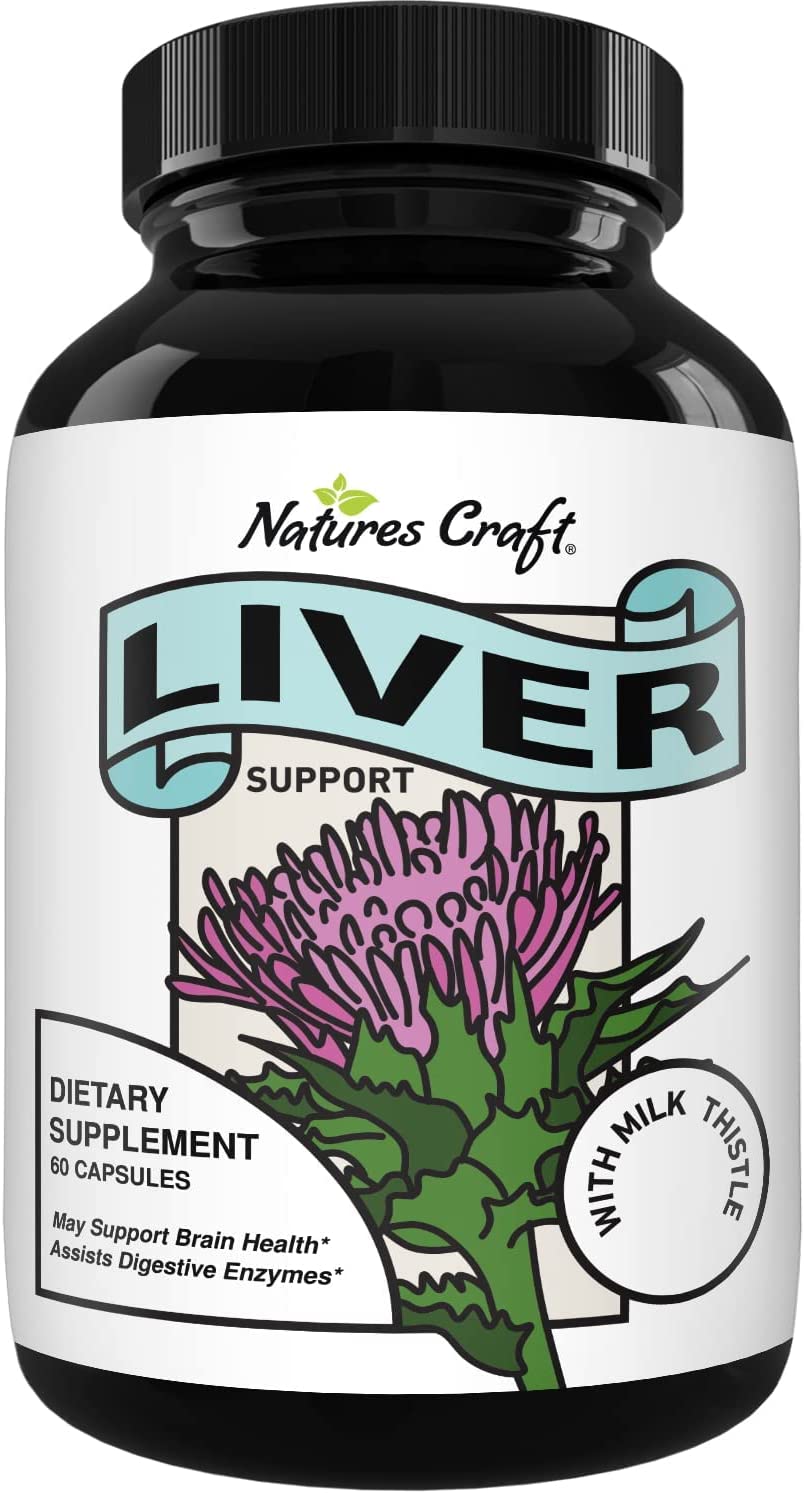
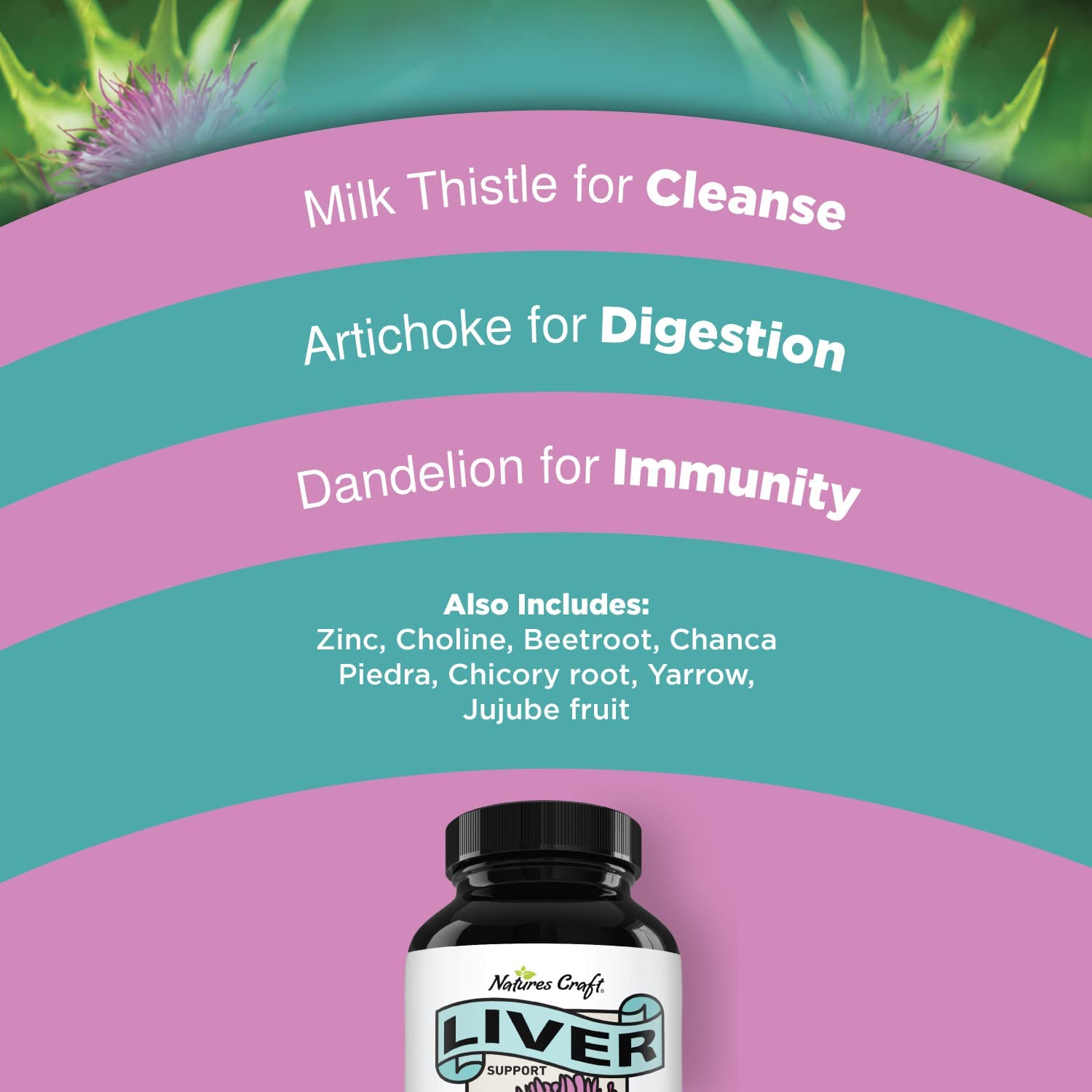
- Advanced Liver Cleanser - Promote stronger functioning with our unique liver detox pills enriched with Chanca piedra Berberine Dandelion root Artichoke leaf and more for liver care you can trust
- Milk Thistle Complex - This liver supplements for men and women are powered by milk thistle and other protective antioxidants to help maintain normal liver function and promote digestion and immunity
- Cleansing Nutrients - Nourish your body with this herbal liver supplements for women and men looking to detox cleanse and protect their livers while also supporting its regular daily functioning
- Clean Complex - This milk thistle herbal supplement is made in a GMP American lab with superstar non GMO botanicals without magnesium stearate or silicone dioxide so you can supplement in confidence
2. VitaLiver Liver Health Supplement Support Liver Cleanse Detox Liquid Delivery for Absorption
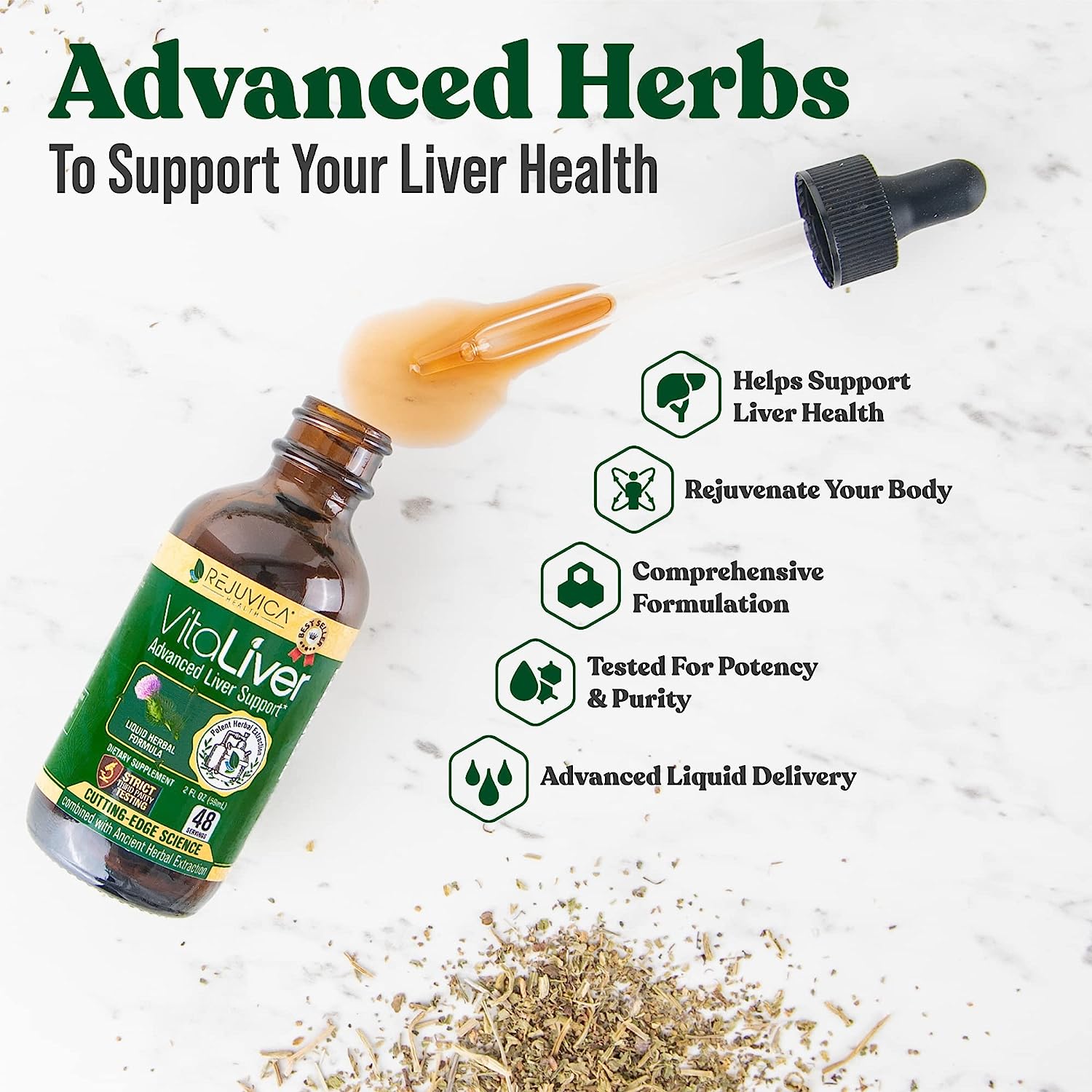
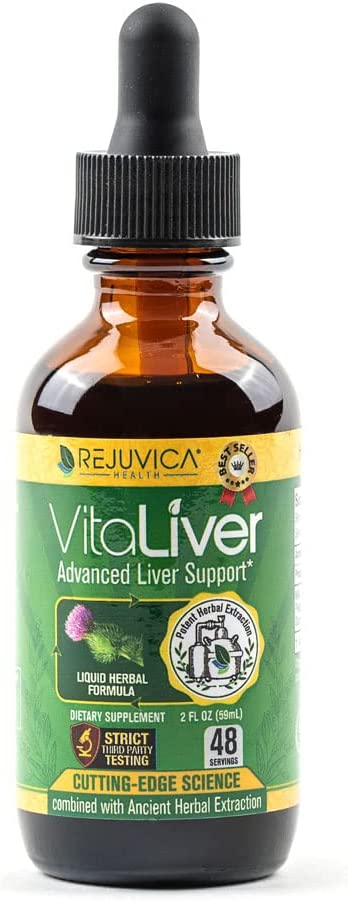
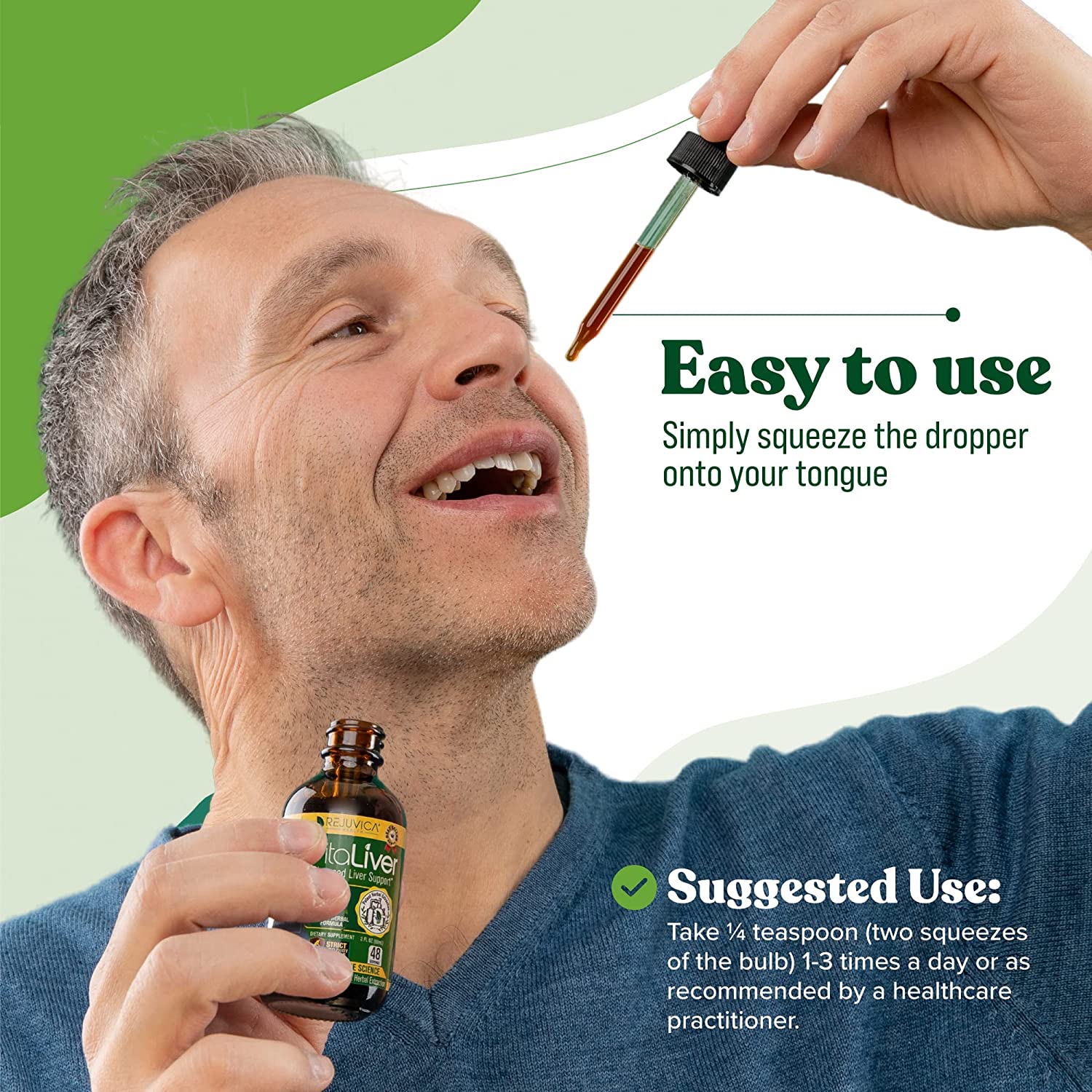
- VitaLiver is the premier natural supplement to help support your liver, and get you back on the road to a healthier you!
- 6 PREMIUM LIVER SUPPORT INGREDIENTS Milk Thistle, Chanca Piedra, Angelica, Artichoke, & Dandelion help support your liver fast!
- GREAT TASTING & EASY TO USE! Taste good this all-natural formula tastes, and it’s as simple as squeezing a dropper on your tongue - no clumsy pills, no water necessary!
- ALCOHOL-FREE LIQUID FORMULA Crafted with advanced extraction process, these liquid formulas are brewed and macerated with an alcohol-free cold-extraction process. Most liquid formulas are made with a warm alcohol extraction that can burn delicate ingredients and render them less effective.
3. PUREHEALTH RESEARCH Liver Supplement Liver Cleanse Detox & Repair with Milk Thistle
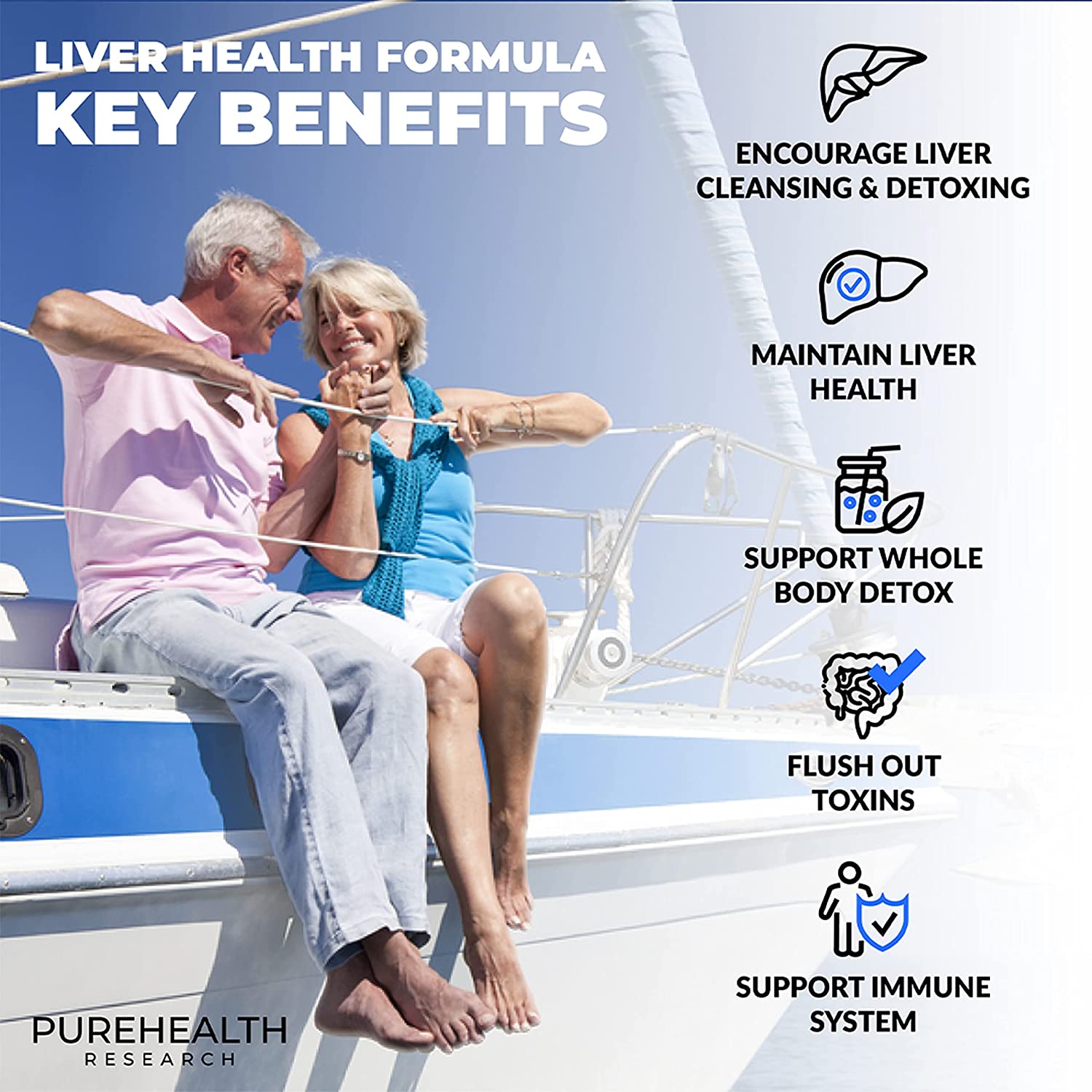
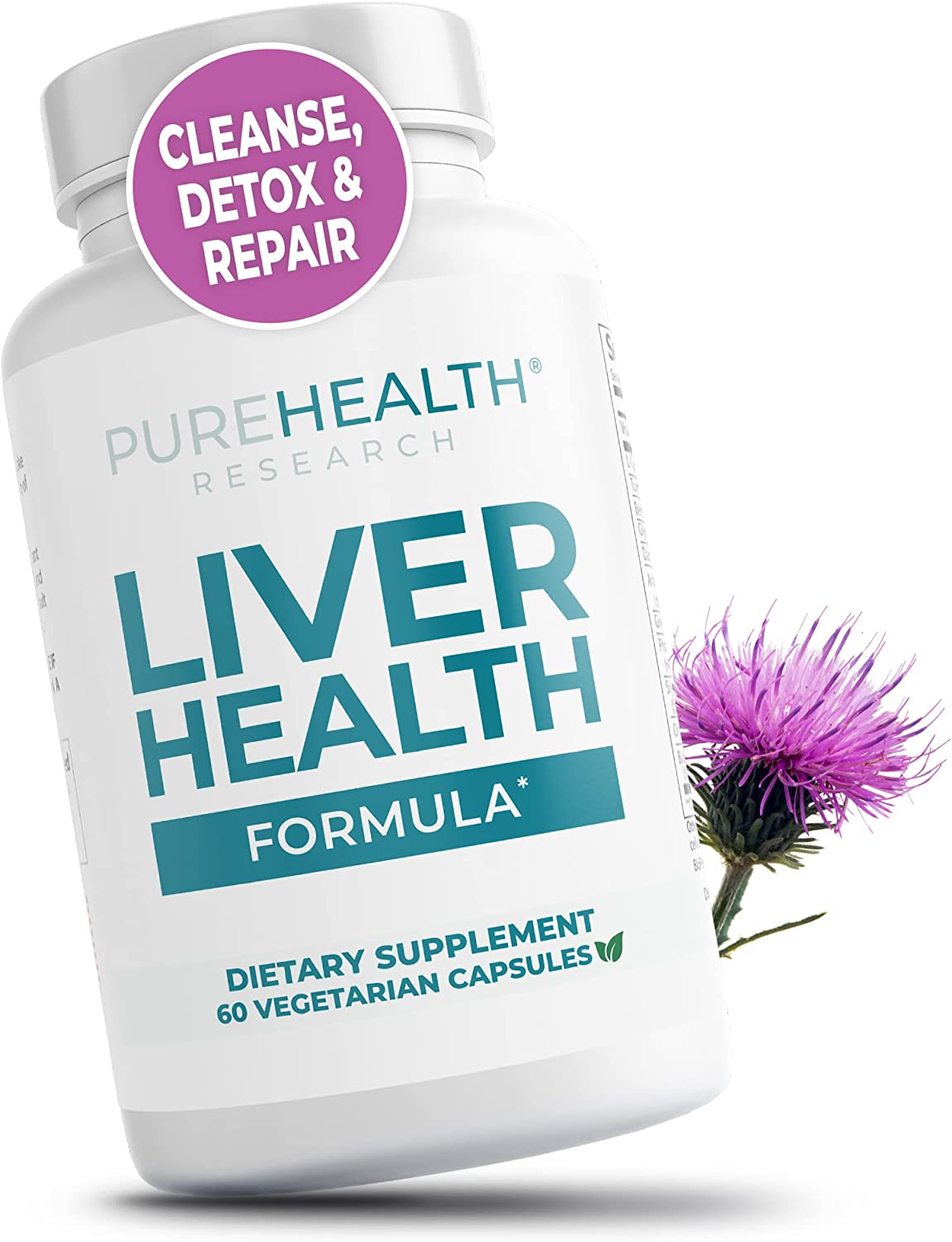
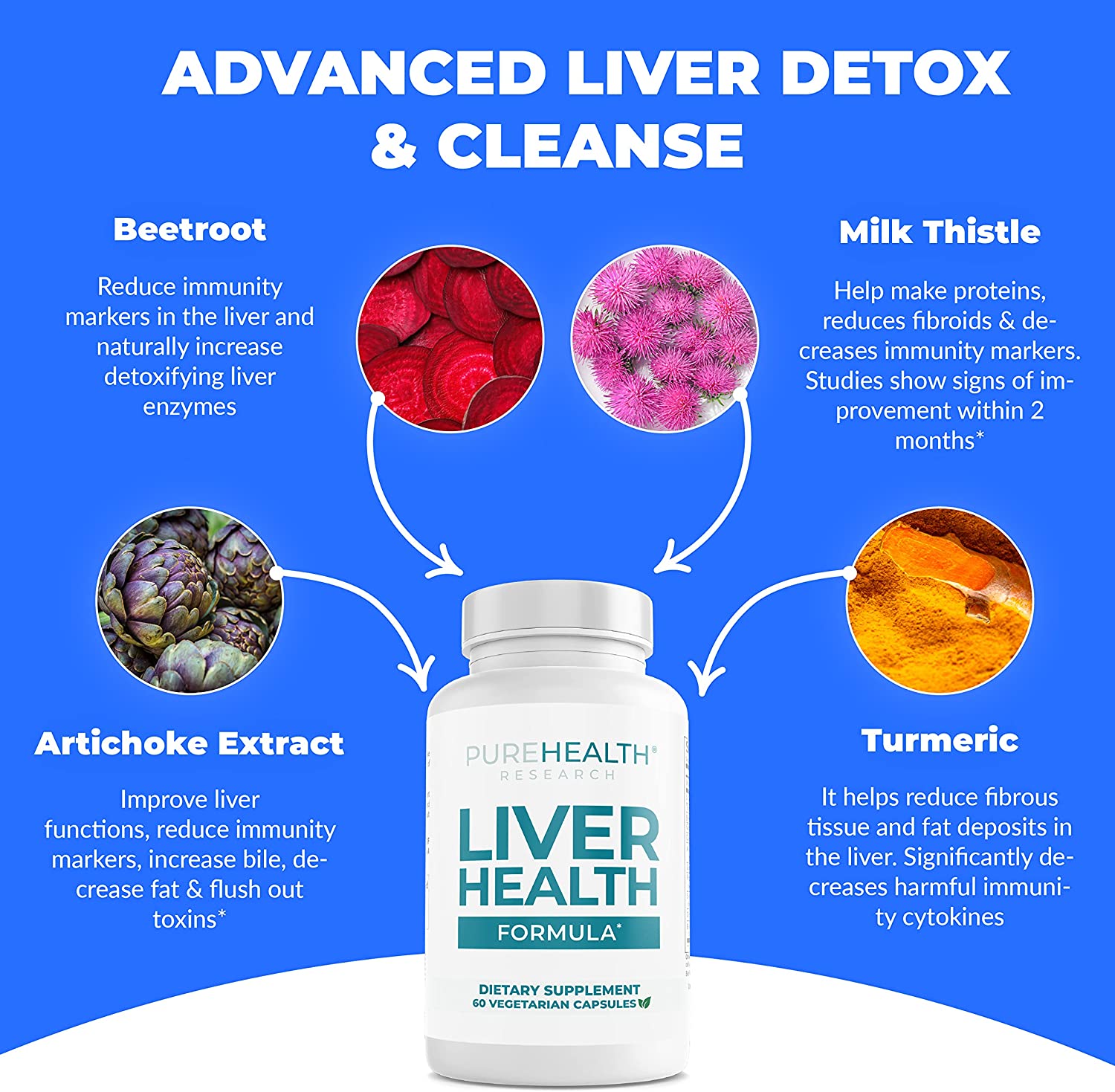
- There are 8 potent natural liver function enhancers in LIVER HEALTH by PureHealth Research. Power-packed with 11 vitamins, 8 minerals, saponins, proteins, antioxidants, and soluble fiber for targeted support of healthy liver metabolism. Each potent ingredient scientifically shows a significant improvement in liver markers, oxidative stress, and functions.
- The Beets in this formula naturally increase detoxifying enzymes, and Dandelion helps flush those toxins from your body. And Milk Thistle helps protect your cells from toxic invaders. LIVER HEALTH helps you feel refreshed and invigorated!
- This unique formulation includes Artichoke and Dandelion to help boost bile production and metabolize fats. Alfalfa is packed with beneficial digestive enzymes. And that not only helps your liver, but it also eases and improves your digestion!
- THIS LIVER HEALTH SUPPLEMENT is packed with 3 exceptional free-radical fighters Turmeric, Beets. These use powerful antioxidants, including glutathione, to protect your sensitive cells from damaging oxidation.
Most FAQs about Liver Health
What are the Functions of the Liver?
The liver is a remarkable organ with a wide range of functions critical to maintaining our overall health and well-being. Here are some of the key functions performed by the liver:
Detoxification: One of the liver's primary functions is detoxification. It filters and neutralizes toxins, drugs, chemicals, and metabolic byproducts that enter our bloodstream. It converts harmful substances into less toxic forms, allowing for their elimination from the body.
Metabolism of Nutrients: The liver plays a crucial role in the metabolism of various nutrients, including carbohydrates, proteins, and fats. It helps regulate blood sugar levels by storing excess glucose as glycogen and releasing it when needed. The liver also converts amino acids into proteins and synthesizes cholesterol and triglycerides.
Bile Production: The liver produces bile, a greenish-yellow fluid necessary for the digestion and absorption of fats. Bile is stored in the gallbladder and released into the small intestine when fat is consumed. It aids in the breakdown and absorption of dietary fats.
Storage of Nutrients: The liver serves as a storage site for several essential nutrients. It stores vitamins, including vitamin A, D, E, K, and B12, and minerals such as iron and copper. These stored nutrients can be released into the bloodstream when needed.
Blood Detoxification: The liver filters the blood coming from the digestive tract, removing toxins, bacteria, and other harmful substances. It also processes and removes old or damaged red blood cells from circulation.
Synthesis of Blood Proteins: The liver synthesizes various blood proteins, including albumin, globulins, and clotting factors. These proteins are crucial for maintaining fluid balance, transporting substances in the bloodstream, and promoting blood clotting.
Immune Function: The liver plays an important role in the immune system by producing immune factors and removing bacteria, viruses, and other pathogens from the bloodstream.
Hormone Regulation: The liver metabolizes and regulates hormones, including those involved in metabolism, growth, and reproduction. It helps maintain hormonal balance by clearing excess hormones from the bloodstream.
Storage and Recycling of Iron: The liver stores excess iron and releases it when needed. It also plays a role in recycling iron from old red blood cells, ensuring its availability for new blood cell production.
These are just a few of the many functions performed by the liver. It is an incredibly versatile organ that supports multiple essential processes in the body, making its proper functioning crucial for overall health.
Where is the Liver Located in the Body?
The liver is located in the upper-right portion of the abdomen, beneath the diaphragm. It is situated primarily on the right side of the body, with a smaller portion extending over to the left side. The liver is positioned just below the ribcage and is protected by the lower ribs on the right side of the chest.
What Diseases Damage the Liver the Most?
The liver can be affected by various diseases, but some of the most common and significant liver diseases that can cause damage include:
Hepatitis: Hepatitis refers to inflammation of the liver, often caused by viral infections. Hepatitis viruses, including hepatitis A, B, C, D, and E, can lead to acute or chronic hepatitis, resulting in liver damage over time.
Non-alcoholic Fatty Liver Disease : NAFLD is characterized by the accumulation of excess fat in the liver, not caused by alcohol consumption. It is commonly associated with obesity, insulin resistance, and metabolic syndrome, and can progress to more severe conditions like non-alcoholic steatohepatitis and liver fibrosis.
Alcoholic Liver Disease (ALD): Excessive and prolonged alcohol consumption can cause alcoholic liver disease. It encompasses a spectrum of conditions ranging from fatty liver (steatosis) to inflammation (alcoholic hepatitis), fibrosis, and ultimately cirrhosis. ALD is one of the leading causes of liver-related mortality worldwide.
Cirrhosis: Cirrhosis is the advanced stage of liver disease characterized by irreversible scarring and impaired liver function. It can result from chronic hepatitis, long-term alcohol abuse, NAFLD/NASH, autoimmune hepatitis, genetic disorders, or certain infections. Cirrhosis can lead to complications such as portal hypertension, liver failure, and an increased risk of liver cancer.
Liver Cancer: Primary liver cancer, also known as hepatocellular carcinoma (HCC), can develop as a result of chronic liver diseases, including chronic viral hepatitis, alcohol-related liver disease, or cirrhosis. Additionally, metastatic cancers originating from other parts of the body can spread to the liver.
Autoimmune Hepatitis: Autoimmune hepatitis is a condition in which the body's immune system mistakenly attacks liver cells, leading to inflammation and potential liver damage. The exact cause is unknown, but genetic and environmental factors are believed to contribute.
Genetic Liver Diseases: Various genetic disorders can affect the liver, such as hemochromatosis (excessive iron accumulation), Wilson's disease (copper accumulation), alpha-1 antitrypsin deficiency (impaired protein production), and others. These conditions can result in liver damage and dysfunction.
It is important to note that prompt medical intervention, lifestyle modifications, and adherence to appropriate treatments can help manage and slow down the progression of liver diseases, thereby reducing the risk of severe liver damage. Regular check-ups, screenings, and early detection are crucial for effective management and treatment of liver diseases.
Can Liver Function be Restored with Healthy Diet and Lifestyle?
Yes, adopting a healthy diet and lifestyle can have a positive impact on liver function and may even help restore liver health in certain cases. Here are some ways in which a healthy diet and lifestyle can support liver function:
Weight Management: Maintaining a healthy weight through a balanced diet and regular exercise can help prevent and manage conditions like non-alcoholic fatty liver disease (NAFLD) and obesity-related liver disease. Losing weight if overweight or obese can reduce fat accumulation in the liver and improve liver function.
Balanced Diet: Consuming a well-balanced diet is crucial for liver health. It should include a variety of fruits, vegetables, whole grains, lean proteins, and healthy fats. Avoiding processed foods, excessive sugar, and unhealthy fats can help reduce inflammation and promote liver health.
Limit Alcohol Consumption: Excessive alcohol consumption can lead to alcoholic liver disease and other liver disorders. Limiting or avoiding alcohol altogether is essential for maintaining liver health and preventing alcohol-related liver damage.
Hydration: Staying adequately hydrated supports overall health, including liver function. Drinking enough water helps flush out toxins from the body and keeps the liver functioning optimally.
Regular Exercise: Engaging in regular physical activity benefits liver health by reducing the risk of obesity, improving insulin sensitivity, and enhancing overall metabolic function. Aim for at least 150 minutes of moderate-intensity exercise or 75 minutes of vigorous exercise per week.
Avoiding Hepatotoxic Substances: Certain medications, herbal supplements, and environmental toxins can be hepatotoxic and cause liver damage. It's important to follow appropriate dosage guidelines and consult healthcare professionals when taking medications or supplements to minimize the risk to the liver.
Hepatitis Prevention and Vaccination: Practicing safe sex, avoiding sharing needles, and getting vaccinated against hepatitis A and B can help prevent viral hepatitis, which can cause significant liver damage.
While adopting a healthy diet and lifestyle can support liver health, it's important to note that the extent of liver damage and the ability to restore liver function can vary depending on the underlying condition.
In cases of advanced liver disease or irreversible damage, medical intervention and treatment may be necessary. It is always advisable to consult with a healthcare professional for personalized guidance and management of liver health.
Which STD Damages the Liver?
Hepatitis B and hepatitis C are the two main sexually transmitted infections (STIs) that can cause liver damage. Both hepatitis B and hepatitis C are viral infections that primarily target the liver, leading to inflammation, liver disease, and potential long-term complications.
These viruses are transmitted through contact with infected blood, semen, vaginal fluids, or other bodily fluids. While the sexual transmission is one of the ways these viruses can spread, it is important to note that they can also be transmitted through other routes, such as sharing needles or syringes, mother-to-child transmission during childbirth, or exposure to contaminated blood.
Hepatitis B: The hepatitis B virus (HBV) can be transmitted through sexual contact with an infected individual. It is highly contagious, and the virus can be present in bodily fluids, including semen and vaginal secretions.
Chronic hepatitis B infection can lead to liver inflammation, cirrhosis, and an increased risk of liver cancer. Hepatitis B can be prevented through vaccination and practicing safe sex, including the use of barrier methods such as condoms.
Hepatitis C: The hepatitis C virus (HCV) can also be sexually transmitted, although the risk of transmission through sexual contact is generally lower compared to other routes of transmission such as sharing needles.
Hepatitis C is primarily transmitted through contact with infected blood. Chronic hepatitis C infection can lead to liver inflammation, cirrhosis, liver failure, and an increased risk of liver cancer. It is important to practice safe sex and avoid sharing needles to prevent HCV transmission.
It's worth noting that other sexually transmitted infections (STIs), such as syphilis or HIV, can also affect the liver indirectly by causing systemic infections or affecting the immune system, which may have an impact on liver health.
It is essential to practice safe sex, get tested regularly for STIs, and seek appropriate medical care and treatment to prevent and manage these infections and protect liver health.
Conclusion
The liver is an extraordinary organ that performs vital functions to keep our bodies healthy and functioning optimally. It is crucial to prioritize liver health by maintaining a balanced diet, limiting alcohol consumption, and incorporating liver-supportive foods and herbs.
By taking care of our liver, we can promote overall well-being and enjoy a healthier life. Consulting a healthcare professional is always recommended before making significant dietary or lifestyle changes.
Stay Healthy!
Relevant Reads>>>













